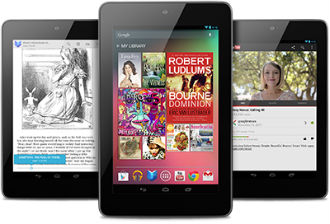 The tablet boom is still going strong and according to Forrester Research, plenty of growth is expected over the next few years. Tablet ownership in Europe is expected to quadruple by 2017.
The tablet boom is still going strong and according to Forrester Research, plenty of growth is expected over the next few years. Tablet ownership in Europe is expected to quadruple by 2017.
At the moment, an estimated 14 percent of European online consumers own a tablet, and the number should hit 55 percent by 2017. But who stands to gain from the boom? As an increasing number of consumers are locked into tablet and smartphone platforms, there doesn’t appear too much room for newcomers to the market.
Tablets are popular with the yoof crowd, but as popularity soars, older folks will embrace them as well. High income customers are also more likely to have a tablet, in fact, almost a quarter already have one. The adoption is much lower for the not so well off, at just 15 percent. Researchers found that tablets are not eating into laptop or smartphone sales, as most consumers have all three.
Europeans rely on smartphones to access the web and stay in touch, but once they get home they prefer tablets. Unlike smartphones, most consumers share their tablets with partners, children or flatmates.
Tablets seem to have hit a sweet spot. They are smaller and more practical than laptops for social activities like watching YouTube in bed, but at the same time they are big enough to make smartphone users get one as a more powerful alternative. Forrester concluded that we are still in the early adoption phase of tablet ownership. This might sound like good news for emerging platforms, but it’s not.
Windows RT tablets will remain too pricey for most, and as Forrester’s figures seem to prove, a lot of growth will come from cheap and cheerful tablets, giving Android an upper hand over iOS and RT. Futurescore’s latest report shows that 15.9 million tablets shipped in Europe in Q4 2012, representing quarterly growth of 78 percent and year-on-year growth of 179 percent. Although Apple still reigns supreme, smaller and cheaper tablets are doing very well indeed. UK sales of Amazon’s Kindle Fire HD are up and the Nexus 7 is also doing well. What’s more, Apple’s new iPad mini seems to be outperforming 9.7-inch iPads.
Another trend that could eat into market share for the established big players is the emergence of “white label” tablets from China. The average retail price for such unbranded tablets was €90 in Q4, while basic 7-inchers with wi-fi sold for as little as €60. In comparison, the average price for branded tablets was €433. Nvidia has recognised this and plans to roll out reference tablet and smartphone designs, allowing many vendors to get on board and slap their stickers on Nvidia tablets, built by Pegatron, apparently.
The availability of cheaper tablets has also led to a decline in the average retail price, which fell 10 per cent to €353. It’s good news for Google, but then again ultra cheap tablets tend to be horrible at the moment.
It all makes for a very dynamic market and watching it develop over the next few years should be quite interesting. Demand for cheaper gear is going up, even among fruit-fanatical brand-snobs. Average selling prices will continue to tumble and this will generate additional demand. Although medium range tablets don’t appear too pricey compared with smartphones, most consumers get high end phones on two-year plans, heavily subsidised by carriers. In contrast, most tablets sell for cash. Companies also tend to buy heaps of smartphones, but not that many tablets.
It’s a double edged sword for low end tablet churners. They are slowly running out of time. Consumers are getting increasingly locked in into their existing platforms, so anyone in the market for a new tablet will probably factor in previous investments in apps and content. This plays into Apple’s hands, and to some extent Amazon’s and Google’s. It will be a lot harder to win over upgrade customers than to get first time buyers, which means Microsoft is at a bit of a disadvantage. Compatibility is also a factor, as most customers tend to stick with the same platform on their smartphone and tablet, which means Apple and Google are unlikely to face any serious challengers in the foreseeable future.





